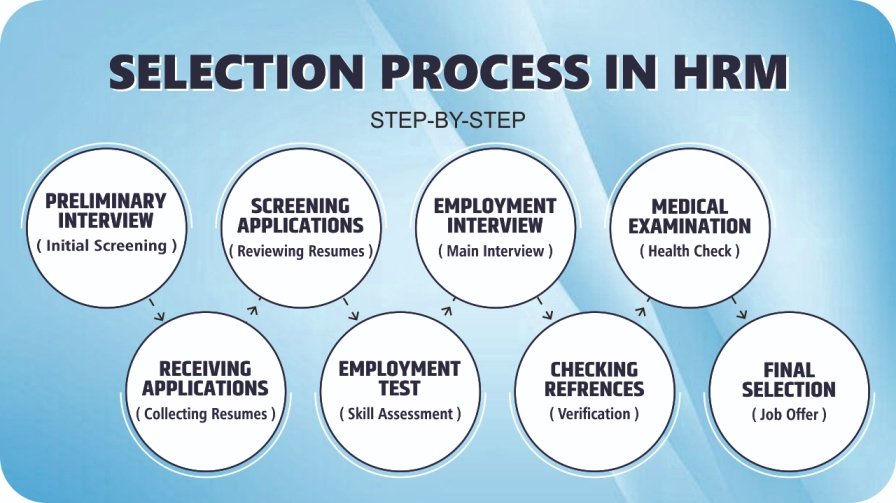Human Resource Management (HRM) is a key part of any organization’s success. One of its most important tasks is the selection process in Human Resource Management, which helps companies find the right people for the right jobs.
The selection process in human resource management is a step-by-step method that helps companies choose the best candidates for a job. It usually involves stages like screening, tests, interviews, and background checks to ensure the right fit.
In this blog, we’ll break down the steps of the hiring process, explain why it’s important, and give you tips on how to succeed in an HR interview.
What is the Full Form of HRM?
What are the roles of the Human Resource Manager?
- Recruitment and Hiring: HR Managers find the right people for the job by looking at resumes, interviewing candidates, and making sure they fit the company’s needs.
- Employee Training and Development: HR Managers help employees learn new skills and improve their work performance. They organize training programs to keep everyone updated with the latest skills.
- Performance Management: They monitor how well employees are doing their jobs and offer feedback to help them improve.
- Employee Relations: HR Managers make sure employees are happy, resolve any conflicts that might come up, and maintain a positive work culture.
- Compensation and Benefits: They manage employee pay, bonuses, and benefits (like health insurance or vacation days), ensuring fairness and competitiveness.
- Legal Compliance: HR Managers make sure the company follows all the laws related to hiring, firing, and employee rights.
What is the Selection Process in Human Resource Management?
In simple terms, the selection process helps companies decide who to hire by carefully checking if a candidate meets the job’s requirements and fits into the company’s culture.
What is the selection process in HRM?

The selection process in HRM is a systematic approach that companies use to find the best candidate for a job. It includes several important steps designed to assess the qualifications, skills, and overall fit of a candidate. Here’s an expanded look at the key steps in the selection process in HRM:
1. Preliminary Interview (Initial Screening)
This is the first step where HR meets the candidate briefly, either through a phone call or video chat. The purpose is to quickly assess whether the candidate meets the basic qualifications for the role. HR checks if the candidate’s skills, experience, and expectations align with the job requirements before moving to the next stage.
2. Receiving Applications (Collecting Resumes)
After the job is posted, candidates send in their resumes and applications. HR collects these applications to start the selection process. This is where HR starts to gather a pool of potential candidates to consider for the role.
3. Screening Applications (Reviewing Resumes)
Once HR has received all the applications, the next step is to carefully review each one. HR looks at the resumes to shortlist candidates who meet the essential qualifications, experience, and skills required for the job. This step helps HR narrow down the large number of applicants to a smaller group who will move on to the next stage.
4. Employment Test (Skill Assessment)
To assess a candidate’s practical skills, many companies require them to complete a test or task that relates to the job. This could be a written test, an aptitude test, or even a practical exercise that evaluates the candidate’s technical abilities. These tests help HR understand whether the candidate can perform the tasks required by the job.
5. Employment Interview (Main Interview)
Candidates who pass the previous steps are invited for an in-depth interview. In this face-to-face or virtual interview, HR asks more detailed questions to assess the candidate’s work experience, problem-solving abilities, and how they would fit into the company’s culture. This is also a chance for candidates to ask questions and learn more about the company.
6. Checking References (Verification)
After the interview, HR contacts the candidate’s references, such as former employers or colleagues, to verify the information provided during the interview. HR checks the candidate’s job history, work performance, and whether they were a reliable and trustworthy employee. This helps confirm that the candidate is the right choice for the role.
7. Medical Examination (Health Check)
Depending on the job, some companies require candidates to undergo a medical examination to ensure they are physically fit for the role. This is particularly important for jobs that involve physical labor, machinery, or safety risks. The medical check ensures that the candidate is in good health and can meet the physical demands of the job.
8. Final Selection (Job Offer)
After completing all the steps, HR makes the final decision. The best candidate is selected and offered the job. The job offer includes details such as salary, benefits, and work expectations. The candidate then decides whether to accept or reject the offer.
Why is the Selection Process Important?
The selection process is very important for a company because it helps them hire the right person for the job. Here’s why it matters:
- Finding the Right Fit: The main goal of the selection process is to hire someone who has the right skills and also fits well with the company’s culture. When the right person is hired, they are more likely to be happy at work and do a good job.
- Improves Productivity: When the right person is hired, they are more likely to do their job well. This helps the company work more efficiently and get better results.
- Reduces Hiring Mistakes: A proper selection process helps companies avoid making mistakes. By carefully checking each candidate, companies can avoid hiring someone who may not be suitable for the job. This saves time and money on training and replacing employees.
- Enhances Company Reputation: When the hiring process is fair and professional, it makes the company look good. Candidates feel respected, and even if they don’t get the job, they may speak positively about the company to others.
- Promotes Fairness and Equal Opportunity: A good selection process makes sure that everyone has an equal chance to get the job, no matter their background. This helps create a diverse and inclusive workplace, which is good for the company.
- Legal Compliance: The selection process also helps companies follow employment laws. By treating all candidates fairly and equally, companies avoid legal issues related to discrimination.
Do You Need an MBA for an HR Interview?
An MBA can be helpful for HR professionals as it teaches business skills, leadership, and decision-making. However, from a hiring manager’s point of view, experience often matters more than a degree.
What really counts in an HR interview are your skills and experience. Employers look for candidates who can do the job well and handle challenges. Some HR roles also need specific knowledge, like understanding labor laws or recruitment, which an MBA doesn’t always cover.
In addition, personal qualities like a good attitude, reliability, and fitting with the company culture are important. If you have these traits and the right skills, you don’t need an MBA to succeed.
Check Out More Blogs
Final Words
The selection process in human resource management is not just about picking anyone for a job. It’s about finding the right person who can do the work well and fit into the company’s team and culture.
In India, this process has become more organised and modern, but its main goal is still the same — to hire the best people.
For students, knowing how this process works can help you get ready for interviews and understand what companies really want. And if you want to work in HR, learning this process is very important.
Frequently Asked Questions
Q1. What is the main goal of the selection process in HRM?
Ans: The main goal is to choose the best person for the job who has the right skills and fits well with the company.
Q2. Do all companies in India use the same selection process?
Ans: No, the steps can be a little different depending on the company, job role, and industry. But the main idea of finding the right candidate stays the same.
Q3. Is group discussion always part of the selection process?
Ans: No, it isn’t always used. It is more common in campus placements and jobs where teamwork and speaking skills matter.
Q4. Can I get an HR job without an MBA?
Ans: Yes, you can. An MBA helps, but what matters more are your HR skills, experience, and how well you understand the work.
Q5. Why is checking references important?
Ans: It helps the company confirm that the information you shared is true and that you were a good and reliable employee in your past jobs.


















